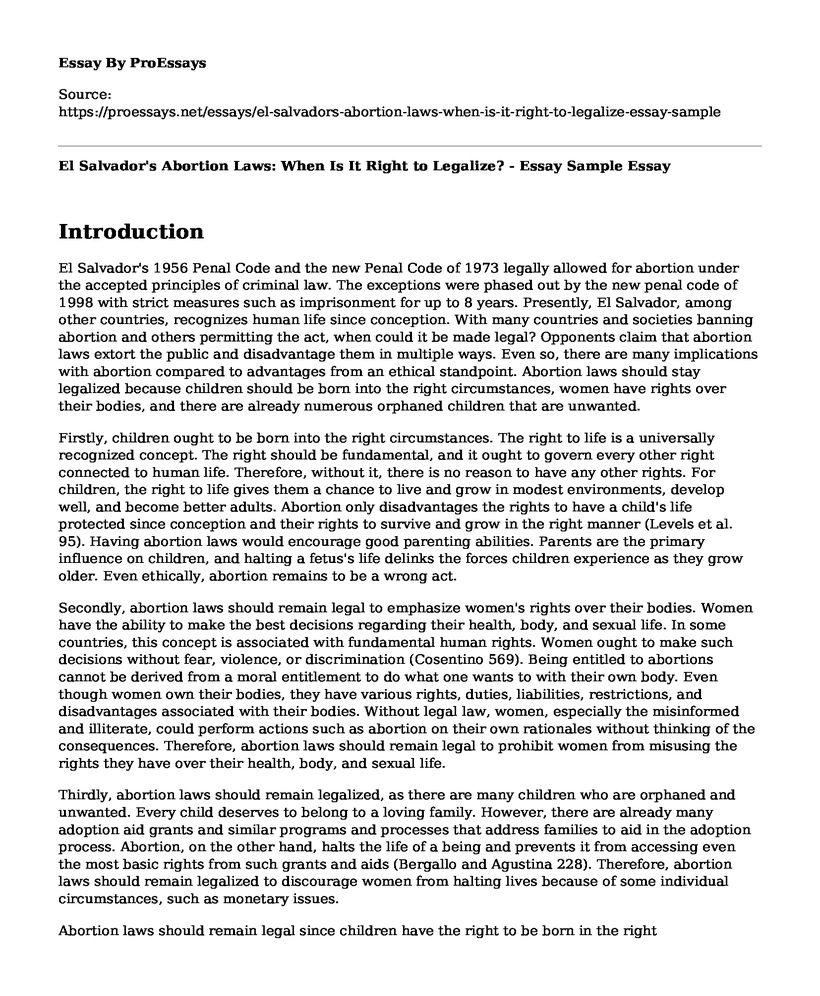Introduction
El Salvador's 1956 Penal Code and the new Penal Code of 1973 legally allowed for abortion under the accepted principles of criminal law. The exceptions were phased out by the new penal code of 1998 with strict measures such as imprisonment for up to 8 years. Presently, El Salvador, among other countries, recognizes human life since conception. With many countries and societies banning abortion and others permitting the act, when could it be made legal? Opponents claim that abortion laws extort the public and disadvantage them in multiple ways. Even so, there are many implications with abortion compared to advantages from an ethical standpoint. Abortion laws should stay legalized because children should be born into the right circumstances, women have rights over their bodies, and there are already numerous orphaned children that are unwanted.
Firstly, children ought to be born into the right circumstances. The right to life is a universally recognized concept. The right should be fundamental, and it ought to govern every other right connected to human life. Therefore, without it, there is no reason to have any other rights. For children, the right to life gives them a chance to live and grow in modest environments, develop well, and become better adults. Abortion only disadvantages the rights to have a child's life protected since conception and their rights to survive and grow in the right manner (Levels et al. 95). Having abortion laws would encourage good parenting abilities. Parents are the primary influence on children, and halting a fetus's life delinks the forces children experience as they grow older. Even ethically, abortion remains to be a wrong act.
Secondly, abortion laws should remain legal to emphasize women's rights over their bodies. Women have the ability to make the best decisions regarding their health, body, and sexual life. In some countries, this concept is associated with fundamental human rights. Women ought to make such decisions without fear, violence, or discrimination (Cosentino 569). Being entitled to abortions cannot be derived from a moral entitlement to do what one wants to with their own body. Even though women own their bodies, they have various rights, duties, liabilities, restrictions, and disadvantages associated with their bodies. Without legal law, women, especially the misinformed and illiterate, could perform actions such as abortion on their own rationales without thinking of the consequences. Therefore, abortion laws should remain legal to prohibit women from misusing the rights they have over their health, body, and sexual life.
Thirdly, abortion laws should remain legalized, as there are many children who are orphaned and unwanted. Every child deserves to belong to a loving family. However, there are already many adoption aid grants and similar programs and processes that address families to aid in the adoption process. Abortion, on the other hand, halts the life of a being and prevents it from accessing even the most basic rights from such grants and aids (Bergallo and Agustina 228). Therefore, abortion laws should remain legalized to discourage women from halting lives because of some individual circumstances, such as monetary issues.
Abortion laws should remain legal since children have the right to be born in the right circumstances, women have individual rights over their bodies, and already there exist many orphaned and unwanted children. Halting a life could deprive children of a right to life. Any human's right is fundamental, and there is no reason to prevent children from accessing modest environments. Additionally, women ought not to misuse the rights granted over their own bodies. Children should live in their families as they deserve the care that any other person would desire. Abortion laws do not extort anyone, and their legalization could lead to more good than harm.
Works Cited
Bergallo, Paola, and Agustina Ramon Michel. "Constitutional developments in Latin American abortion law." International Journal of Gynecology & Obstetrics, vol 135, no. 2, 2016, 228-231.
Cosentino, Chiara. "Safe and legal abortion: An emerging human right? The long-lasting dispute with state sovereignty in ECHR jurisprudence." Human Rights Law Review, vol. 15, no. 3, 2015, 569-589.
Levels, Mark, et al. "A review of abortion laws in Western-European countries. A cross-national comparison of legal developments between 1960 and 2010." Health policy, vol 118, no. 1, 2014, 95-104.
Cite this page
El Salvador's Abortion Laws: When Is It Right to Legalize? - Essay Sample. (2023, Mar 13). Retrieved from https://proessays.net/essays/el-salvadors-abortion-laws-when-is-it-right-to-legalize-essay-sample
If you are the original author of this essay and no longer wish to have it published on the ProEssays website, please click below to request its removal:
- Paper on Corrective Operations for Congenital Heart Disease: Fontan, Mustard, Rastelli and TOF Repair
- Genetics in Treating and Developing Cancer Paper Example
- Essay Example on Charges Against Epstein: Prosecutor Consultant Demands
- Police Officers: Recognizing Signs of Serial Killers - Essay Sample
- Free Report Example on Rehab Services: Peterson Health Care's Mission
- Free Essay Example on Addressing Nursing Shortage: Educational Background, Expertise
- Causes of PTSD For Military Members - Free Essay







